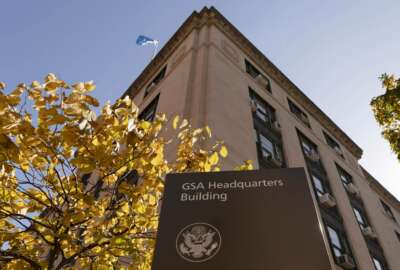Hubbard Radio Washington DC, LLC. All rights reserved. This website is not intended for users located within the European Economic Area.
Omnibus bill rethinks federal office space needs, ramps up building security
A comprehensive spending bill for the rest of fiscal 2023 outlines a plan for federal buildings, including a way forward for the headquarters of two federal law...
Best listening experience is on Chrome, Firefox or Safari. Subscribe to Federal Drive’s daily audio interviews on Apple Podcasts or PodcastOne.
A comprehensive spending bill for the rest of fiscal 2023 outlines a plan for federal buildings, including a way forward for the headquarters of two federal law enforcement agencies.
The fiscal 2023 omnibus spending bill Congress released this week to fund federal operations and avert a government shutdown on Friday directs the General Services Administration to further consolidate office space for the federal workforce.
It also refocuses plans for two of the biggest federal construction projects — finishing a consolidated headquarters for the Department of Homeland Security, and starting work on a new suburban headquarters for the FBI.
The comprehensive spending plan also seeks to harden the security of federal buildings given a rise in threats and supports the Biden administration’s goal to make all federal buildings achieve net-zero emissions by 2045.
Here’s a rundown of the biggest federal building provisions in the FY 2023 omnibus:
GSA updates on future of federal workspace
The omnibus language advances the Biden administration’s plans to save money by shrinking the federal portfolio of office space.
The omnibus spending bill directs GSA to provide regular briefings to the House and Senate appropriations committees on how agencies can reduce their office space requirements “based on the lessons learned from the use of telework during the pandemic.”
The Office of Management and Budget, in a July 20 memo, directed agencies to rethink their office space needs for the future of work in the federal sector. OMB gave agencies until Dec. 16 to submit their capital plans, which will outline workspace needs through 2028.
GSA, meanwhile, is setting its own goals to consolidate federal office space, and helping agencies support hybrid and remote workforces through its Workplace 2030 initiative.
The Public Buildings Reform Board, an independent agency tasked with identifying high-value but underutilized federal real estate, gets a $4 million budget for the rest of fiscal 2023.
The board recently regained a quorum. President Joe Biden appointed former Rep. Michael Capuano and New York real estate developer Jeffrey Gural to serve on the board in November.
The 2016 Federal Assets Sale and Transfer Act directs the board to identify underused federal properties and expedite their sale or disposal. GSA made at least six property sales so far, based on the board’s recommendations, according to a recent Government Accountability Office report
Among its recommendations, the board proposed selling at National Archives and Records Administration facility in Seattle, but OMB blocked the sale after a federal lawsuit led by Washington State’s attorney general and Native American tribes challenged the decision.
The lawsuit argued the sale of the NARA archives would make tribal and treaty records inaccessible for tribes that use those records for federal recognition and other official purposes.
The omnibus prohibits the board from moving forward with a sale of the NARA Seattle facility “until all of its records are digitized and available online or relocated to another facility in the Seattle area.”
Ramping up federal building security
The spending bill grants more than $2 billion to the Federal Protective Service, a fee-funded agency.
The money would go toward installing security cameras and alarm systems at federal buildings owned by GSA. The spending bill gives FPS 180 days to brief the committees to report on the status of adding these devices.
Congress is issuing the spending as part of a heavily redacted audit from the GSA inspector general’s office on the state of security cameras and alarms at federal buildings.
The Government Accountability Office told members of the House Homeland Security Committee in October that agencies only implemented about 22% of FPS security recommendations between fiscal years 2017 and 2021.
The committee held the hearing in part to examine a rise in threats directed at federal employees and their workplaces. FPS told lawmakers escalation of threats was focused on the FBI, the Internal Revenue Service and the National Archives and Records Administration.
The rise in threats prompted the IRS to conduct its own security review this year.
A final decision on suburban FBI headquarters
The omnibus also gives GSA $375 million to construct a new suburban FBI headquarters, but also requires GSA to go through some final steps before the agency can decide whether to build in Maryland or Virginia.
GSA is considered three sites for the new FBI headquarters: Greenbelt, Maryland; Landover, Maryland and Springfield, Virginia.
Language in the fiscal 2023 omnibus gives GSA no more than 90 days to consult with Maryland and Virginia lawmakers one final time, and consider how each of the final three proposed sites delivers on the Biden administration’s equity agenda.
The omnibus also requires GSA to “evaluate the viability of the GSA’s site selection criteria for the FBI headquarters to ensure it is consistent with congressional intent.”
Sens. Ben Cardin (D-Md.) and Chris Van Hollen (D-Md.) and House Majority Leader Steny Hoyer (D-Md.) included this provision in the bill. The lawmakers argue putting the new FBI headquarters in Prince George’s County, with a majority Black population, would advance the Biden administration’s equity agenda.
“As the GSA weighs the final site selection, their top priority must be to ensure a fair and transparent process in line with both congressional intent and with the administration’s commitment to addressing long-standing inequity in the siting of federal projects and agencies. This language will help us as we pursue that goal,” the lawmakers said in a statement.
GSA in September released its criteria that will determine its final selection for an FBI headquarters site. Among its criteria, the rubric favors a final site with proximity to the FBI’s law enforcement training center in Quantico, Virginia, and the Justice Department’s headquarters in Washington.
The bill doesn’t give the FBI any additional funds for a new headquarters, but it does give the FBI $651 million for construction for “its highest priorities outside the immediate national capital area.” That spending includes safety and security upgrades at its law enforcement training center in Quantico.
Sens. Tim Kaine (D-Va.) and Mark Warner (D-Va.) said in a statement Tuesday that they “look forward to continuing to work with the administration to bring an FBI headquarters that best supports the mission of the FBI, to Northern Virginia.”
A final decision on the FBI headquarters may soon be reached, but lawmakers in the omnibus warn that the delayed decision “only increases the need to secure viable space for supporting a variety of mission, workforce, and land requirements.”
“The agreement continues support for the FBI’s long-term vision for collocating complementary mission operations while balancing the eventual transition into a new headquarters building with changing footprints at Quantico, Clarksburg, Huntsville and Pocatello facilities,” lawmakers wrote.
The spending bill includes $590 million to support the FBI’s 21st-Century Facility Plans, which includes the FBI transiting from interim facilities to “full operating capabilities.”
The bill also directs the FBI to consider the feasibility of leased space, “provided annual lease and operating costs are reasonable and facilities can be built and maintained that meet FBI’s operational and security requirements.”
A way forward for DHS consolidated campus
The spending bill gives GSA $10 billion in spending authority through the Federal Buildings Fund, and nearly $37 million in emergency supplemental funding to repair federal buildings damaged by Hurricane Ian.
Among its major construction projects, GSA receives $253 million to continue construction on a consolidated DHS headquarters.
The St. Elizabeths campus is the most ambitious federal building project since the Pentagon, and has been in the works since 2009. The master plan for the campus has gone through several updates over the years to reflect delays and congressional funding far below what GSA and DHS have needed.
Under the latest plan, GSA and DHS expect the campus, with 5.7 million square feet of office space, will be completed by fiscal 2026. But several DHS components — including the Federal Emergency Management Agency, Transportation Security Administration and U.S. Citizenship and Immigration Services — have decided not to relocate to St. Elizabeths, and have opted to remain in leased office space or build their own headquarters in the Washington suburbs.
The spending bill gives DHS an additional $188 million to consolidate its offices in the national capital region as part of the St. E’s project. It also gives DHS 60 days to provide House and Senate appropriations committees with an updated master plan for the campus.
The updated master plan from DHS should include an updated overall cost for the campus and the average number of DHS employees, by component, who are slated to work on-site at the campus. The plan should also include the average number of DHS employees who will telework.
The federal employee occupancy plan for the campus should also provide comparisons with the original master plan.
Lower carbon emissions for federal buildings
The comprehensive spending bill for fiscal 2023 also gives GSA further guidance to implement the Biden’s administration’s green government goals.
Biden signed an executive order a year ago for agencies to make the federal building portfolio zero-emission by 2045, and reach a 50% reduction in greenhouse gas emissions by 2032, compared to baseline levels from 2008. It also directs agencies to make federal buildings more energy and water-efficient, as well as more resilient against climate change.
The spending bill directs GSA to meet the carbon reductions for federal buildings, as outlined in the executive order, and to “incorporate considerations of energy security, cybersecurity, reliability and resiliency” in new construction and upgrades.
To support this work, lawmakers direct GSA to create a “library of buildings.” The library is a database of typical federal buildings and the carbon emissions from construction and maintenance throughout the building’s lifespan.
The spending bill requires GSA to make this data public, and use the library to “inform future policy direction on reductions below the baselines to maximize carbon reduction in federal buildings.”
Copyright © 2024 Federal News Network. All rights reserved. This website is not intended for users located within the European Economic Area.
Jory Heckman
Jory Heckman is a reporter at Federal News Network covering U.S. Postal Service, IRS, big data and technology issues.
Follow @jheckmanWFED
Related Stories
Amelia Brust/Federal News Network

Want to see the office space of the future? GSA wants to show you the way
(AP Photo/Jacquelyn Martin)

GSA sets goals to shrink federal office space post-COVID, but needs to address maintenance backlog
Related Stories
-
Want to see the office space of the future? GSA wants to show you the way Leasing/Property Management


